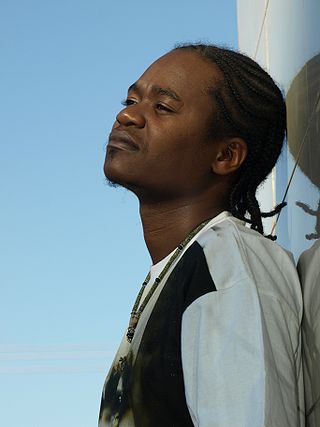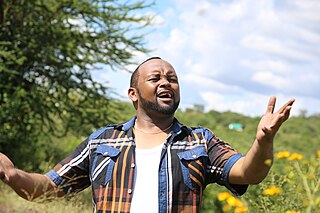Related Research Articles

The Luo, are several ethnically and linguistically related Nilotic ethnic groups that inhabit an area ranging from Egypt and Sudan to South Sudan and Ethiopia, through Northern Uganda and eastern Congo (DRC), into western Kenya, and the Mara Region of Tanzania. Their Luo languages belong to the western branch of the Nilotic language family.

Kisumu is the third-largest city in Kenya after the capital, Nairobi, and Mombasa. It is the second-largest city after Kampala in the Lake Victoria Basin. The city has a population of slightly over 600,000. The metro region, including Maseno and Ahero, has a population of 1,155,574 people according to the 2019 Kenya Population and Housing Census which was conducted by the Kenya National Bureau of Statistics.

The Luo of Kenya and Tanzania are a Nilotic ethnic group native to western Kenya and the Mara Region of northern Tanzania in East Africa. The Luo are the fourth-largest ethnic group (10.65%) in Kenya, after the Kikuyu (17.13%), the Luhya (14.35%) and the Kalenjin (13.37%). The Tanzanian Luo population was estimated at 1.1 million in 2001 and 3.4 million in 2020. They are part of a larger group of related Luo peoples who inhabit an area ranging from South Sudan, southwestern Ethiopia, northern and eastern Uganda, southwestern Kenya, and northern Tanzania.
Job Seda, better known as Ayub Ogada, was a Kenyan singer. He was a singer favoring the nyatiti as his characteristic instrument. His music is known to have a natural feel to it, having songs of birds, the calls of animals and the sounds of children playing in the background.
Daniel Owino Misiani was a Tanzanian-born musician based in Kenya, where he led the Shirati Jazz collective. He was known as the "King of History" in Kenya; overseas and in Tanzania, he was known as "the grandfather of benga", which he pioneered.
Hubert Mbuku Nakitare, commonly known by his stage name Nonini, is a Kenyan rapper and former radio presenter. He is often referred to as the Godfather because he is very well known.
David Mathenge, better known by his stage name Nameless, is a Kenyan pop artist.
Tedd Josiah is a music producer from Kenya. He started as a musician, first briefly with the group Ebony Affair before forming a new group, Hart, in 1993.

Joseph Mayanja, better known by the stage name Jose Chameleone, is a Ugandan AfroBeat artist and musician. Chameleone sings in Luganda, English, and Swahili.

The Kisima Music Awards is an annual awards program that recognises musical talent in East Africa. Despite being Kenyan-based the scheme awards artists from a variety of countries, predominantly Kenya, Uganda and Tanzania, and incorporates a range of music genres.

Paul Julius Nunda, better known by his stage name Jua Cali, is a Kenyan rapper and record producer. In 2000, together with record producer Clemo, he founded Calif Records where he has been ever since producing music which dominated East African music alongside Jose Chameleone of Uganda and Mr. Nice of Tanzania. Jua Cali performs in Swahili and Sheng in a popular Kenyan style of rapping called genge.
Ohangla is a traditional dance among the Luo community. It was used to celebrate weddings and also in funeral ceremony as part of Tero Buru. Ohangla consists of more than 8 drums hit by a stick and a cylindrical shoulder slung drum played normally to the accompaniment of flute, Nyatiti or kinanda. Tony Nyadundo, Prince Indah, Emma Jalamo, Otieno Aloka, Freddy Jakadongo, Osogo Winyo and Onyi Papa Jey are among the best known Ohangla musicians.The original Ohangla has very fast tempo nature and vulgar messages convey in the music. Local elders used to ban ohangla music in the early 1980s because the music was meant for adults, "the songs can only be interpreted by very intelligent or mature people, but not children or teenagers" says Juma Oketch, an ohangla band vocalist based in Nairobi.
Cecilia Wairimu, better known by her stage name Amani, is a Kenyan singer and songwriter. Her contributions to the Kenyan music industry have earned her several coveted accolades, including the Best Female category at the 2009 MTV Africa Music Awards, Pearl of Africa Music Awards, Kisima Awards, and Chaguo La Teeniez Awards. She released her debut album in 2006.
Kleptomaniax is a rap group from Nairobi, Kenya. The group consists of three members: Roba, Collo and Nyashinski.

Nyota Ndogo is a musician from Kenya who performs taarab-influenced pop music.

Rehema Chalamila, popularly known by her stage name Ray C, is a musician from Tanzania. Her genre of music is afro pop, specifically Bongo flava.
Deux Vultures is a musical group in Kenya performing hip hop and pop music.
Onyi Papa Jey is an ohangla musician from Kenya
Princess Jully is a benga musician from Kenya.

Dr Mbuvi is a Kenyan award-winning contemporary gospel singer, comedian, and TV presenter. Born Victor Mbuvi, he drew his love for music from his childhood and inspiration from his mother who died in 1999, a year before Dr Mbuvi launched his music career. Dr Mbuvi joined a group called His Image, who performed a cappella and various renditions of other artistes’ works. We even modernised a Luo gospel folk song Niwara Nono. In 2001, he briefly teamed up with music producer R Kay and a friend to form Injili Group, which recorded Nisamehe – his first ever hit song.
References
- 1 2 3 4 5 6 7 8 "Top Kenyan traditional musician to perform in Rwanda". The New Times | Rwanda. 15 October 2011. Retrieved 28 May 2020.
- ↑ Nyanga, Caroline (2020). "From a tailor to king of Ohangla". The Standard. Retrieved 9 June 2023.
- 1 2 3 Daily Nation, 7 August 2009: King of Ohangla speaks
- ↑ The Standard, 25 August 2006: Tony Nyadundo, Ohangla King Archived 31 May 2009 at archive.today
- ↑ Kisima Awards winners 2007
- ↑ The Standard, 21 August 2007: 100 most influential Kenyans Archived 13 October 2007 at the Wayback Machine
- ↑ The Standard, 21 August 2007: 100 most influential Kenyans – Entertainment
- ↑ The Standard, 2 October 2009: Nyadundo album launch Archived 16 July 2011 at the Wayback Machine
- ↑ The Standard, 7 December 2008: Ohangla maestro spreads his wings
- ↑ Nation, Daily (21 June 2020). "Nyadundo still Kenya's most valuable artiste". Nation. Retrieved 9 June 2023.